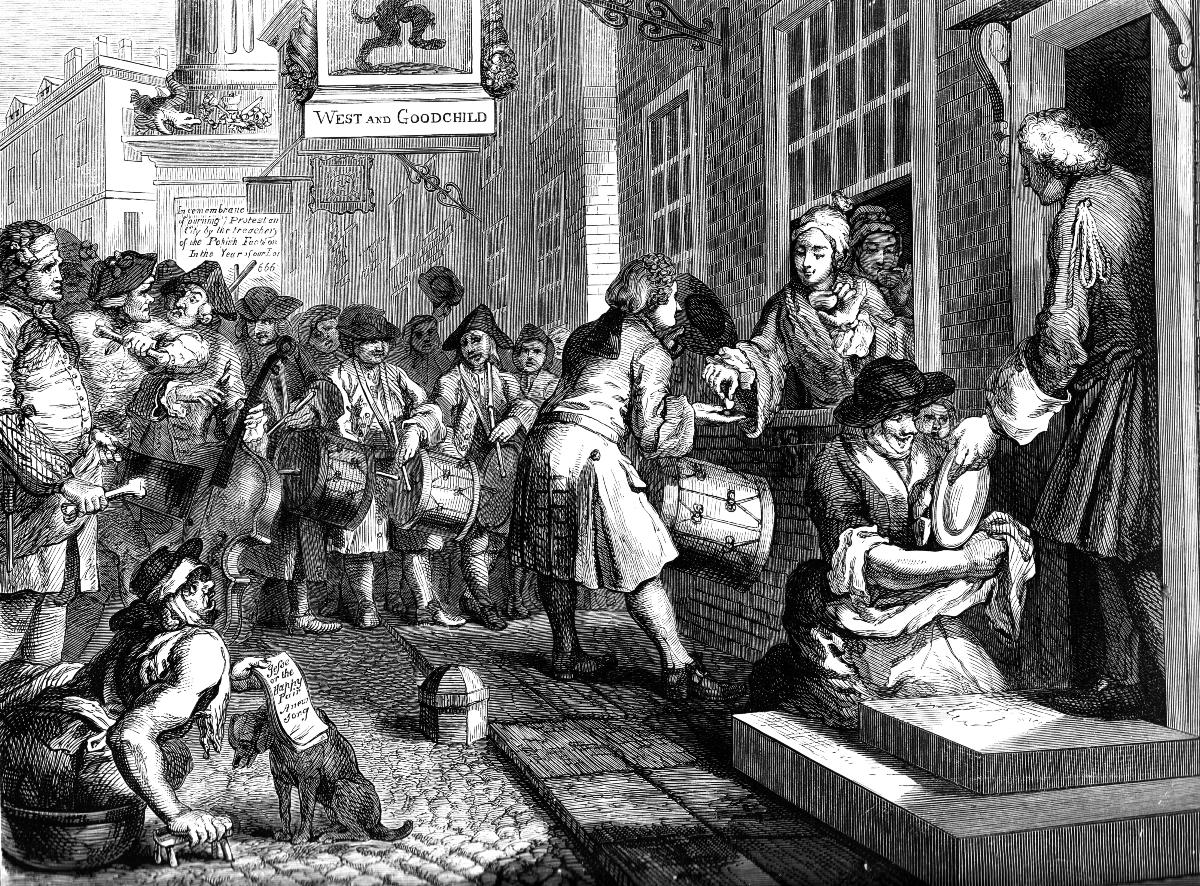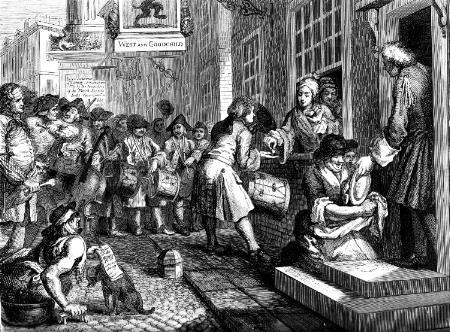
|

|
The amazing web site of Shakespeare's Sonnets. Industry and Idleness. Plate 6. The Industrious Apprentice out of his Time and married to his Master's daughter, by Hogarth.
HAKESPEARE'S
ONNETS
This is part of the web site of Shakespeare's sonnets
PICTURE GALLERY.
William Hogarth 1697 - 1764.
Industry
and Idleness. Plate 6. The Industrious Apprentice
out of his Time and married to his Master's daughter.
1747.
| Hogarth
first achieved fame as an artist through his series of moralistic
engravings, commencing with A
Harlot's Progress
in 1731. This was followed by A
Rake's Progress
in 1735, Marriage
ŕ-la-mode
in 1743-5, and Industry
and Idleness in
1747
. Originally the sets of pictures were oil
paintings which
Hogarth subsequently published as engravings. However the
Industry and Idleness series was conceived entirely as a set
of engravings which were not copied from paintings. They were
put on sale for one shilling each, which is equivalent today, (2008),
to about ten pounds sterling (GBP). Evidently Hogarth was
trying
to appeal to a wider audience than the upper class wealthy who were his
usual patrons. The Industry and Idleness series is rather crudely moralistic, depicting how industry and virtue are rewarded with worldly success, while idleness, corruption and vice is ultimately punished by the gallows. Despite this rather tedious tale, which is not true to life and simplistically misrepresents the apprenticeship system of the time, the engravings are a superb record of both the lower and upper end of London life of the time. The banqueting scene of Plate 8 and the two final crowd scenes of the Tyburn spectacle and the Lord Mayor's Parade are incomparable and show the satirical Hogarth at his very best. |
||
| The
Industrious Apprentice has completed his seven years or so as an
apprentice weaver and has evidently become a partner in the firm.
This scene probably shows the day after his wedding to the
master's daughter. Frank and his wife elegantly sip tea from
porcelain tea bowls, expensive fashionable commodities
imported from China. Frank is giving a coin to the chief
drummer while a member of the deserving poor with a child at her
shoulder receives scraps from a plate given to her by a footman at the
door. On the opposite side a butcher with his marrow bone and
meat cleaver looks on enviously. Another butcher is elbowing
away a Frenchman who has been playing the bass-viol. On the
ground, holding a broadsheet, is a well known beggar cripple who was
known as Philip-in-the-tub. The tub is his means of
locomotion, as he has no legs, and he is here trying to sell the song
'Jesse, or the happy pair'. In the background is the London
Monument, a huge Doric pillar designed by Christopher Wren and Robert
Hooke and commemorating the Great Fire of London in 1666. The
inscription on the East side generally blamed the Popish Faction (Roman
Catholics) for the event. The inscription was removed in
1831. |
||


Shakespeare's Sonnets:
| Start here with the first sonnet |
|
Sonnets 1 - 50 | Some links to other sites | ||
|
|
Sonnets 51 - 100 | ||||
|
|
|
Sonnets 101 - 154 | For
a global search use all the sonnets as
plain text 1-154 or use the first line index. |
If
you have enjoyed this web site, please
visit its companion - Pushkin's Poems |
|
| Map of the site | |||||
| Views of London as it was in 1616. |
London Bridge As it was in Shakespeare's day, circa 1600. |
To
search for a line or phrase in the sonnets
go to the sonnets as plain text and use the browser text search engine. |
| Views of London as it was in 1616. |
London Bridge As it was in Shakespeare's day, circa 1600. |
To search for a line or phrase in the sonnets
go to the Sonnets as plain text and use the browser text search engine. |
| Sonnets 1 - 50 | Back to home page | |
| Sonnets 51 - 100 | If
you have enjoyed this web site, please
visit its companion - Pushkin's Poems |
|
| Sonnets 101 - 154 | If you wish to comment on this site please refer to details on the home page. | |
| Copyright Šof this site belongs to Oxquarry Books Ltd |

Copyright Šof this site belongs to Oxquarry Books Ltd